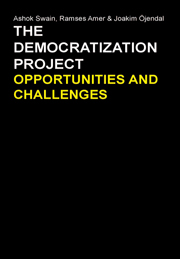Book contents
- Frontmatter
- Contents
- List of Tables
- List of Figures
- Acknowledgements
- Contributors
- The Democratization Project: Opportunities and Challenges
- 1 The Democratization Project: Peace, Conflict and Development
- 2 Non-Authorized Military Interventions and Legitimization by the United Nations
- 3 From Condemnation to Legitimization of Outcome: The United Nations and the Use of Force in Inter-State Relations
- 4 Demos or Deus: Patterns of Religious Dimensions in Asian Armed Conflicts, 1945–2005
- 5 The Left and Democratic Consolidation – Deepening Democracy in Latin America?
- 6 Democracy without People? – The Risk of Monopolizing the Democratization Project
- 7 The Role of Hamas in Building Palestinian Democracy in the Midst of Violence
- 8 Elections and Violence in Sri Lanka: Understanding Variation Across Three Parliamentary Elections
- 9 Post-Accord Elections and Armed Conflict
- 10 Peace Through Democracy? The Challenges of Postwar Democratization in Weak and War-Torn States
1 - The Democratization Project: Peace, Conflict and Development
Published online by Cambridge University Press: 05 March 2012
- Frontmatter
- Contents
- List of Tables
- List of Figures
- Acknowledgements
- Contributors
- The Democratization Project: Opportunities and Challenges
- 1 The Democratization Project: Peace, Conflict and Development
- 2 Non-Authorized Military Interventions and Legitimization by the United Nations
- 3 From Condemnation to Legitimization of Outcome: The United Nations and the Use of Force in Inter-State Relations
- 4 Demos or Deus: Patterns of Religious Dimensions in Asian Armed Conflicts, 1945–2005
- 5 The Left and Democratic Consolidation – Deepening Democracy in Latin America?
- 6 Democracy without People? – The Risk of Monopolizing the Democratization Project
- 7 The Role of Hamas in Building Palestinian Democracy in the Midst of Violence
- 8 Elections and Violence in Sri Lanka: Understanding Variation Across Three Parliamentary Elections
- 9 Post-Accord Elections and Armed Conflict
- 10 Peace Through Democracy? The Challenges of Postwar Democratization in Weak and War-Torn States
Summary
Introduction and Context
In 1974, starting with the arrival of democracy in Portugal, more than 60 countries in Europe, Latin America, Asia, and Africa have made transitions from authoritarianism to some form of democracy. Democracy has now become the dominant form of government in the world. Its appeal and popularity is more widespread than ever before. Many political struggles are increasingly being fought in different parts of the world in the name of democracy. The democratic development in many of these newly democratic countries has often been sluggish, turbulent and marked by regular reversals. Though performance of many of these democracies continues to be disappointing, the cases of complete reversal from democracy to authoritarian rule are very few. In the last century, the per cent of global population living in democratic countries has increased from 12 per cent in 1900 to 63 per cent in 2000. A near consensus has now been achieved among decision-makers and academics alike on the virtues of democracy. Besides freedom and prosperity, successful democratization is argued to bring peace and security to unstable regions of the world.
This global trend relates mainly to developments within individual countries or within a number of countries, i.e., the internal or domestic developments. If ‘democracy’ is interpreted as a particular system of governance, this approach may be adequate.
- Type
- Chapter
- Information
- The Democratization ProjectOpportunities and Challenges, pp. 1 - 16Publisher: Anthem PressPrint publication year: 2009

